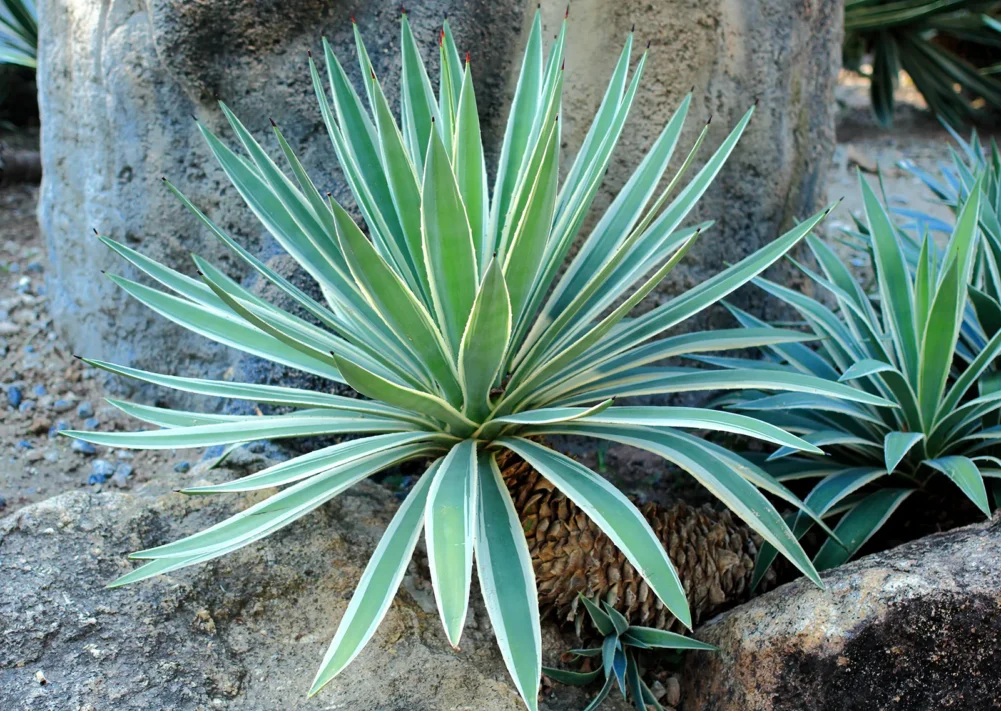Agave Seeds
₹80.00 Original price was: ₹80.00.₹50.00Current price is: ₹50.00.
The Agave plant is a remarkable and versatile succulent that has played a significant role in various cultures, particularly in Mexico. Its unique growth habit, resilience to harsh climates, and wide range of uses—from beverage production to fiber extraction—make it a valuable plant both economically and ecologically. Whether used in traditional medicine, as a source of natural sweeteners, or as an ornamental feature in gardens, Agave remains an important plant with a rich history and diverse applications.
Out of stock
The Agave tree, often referred to as just “Agave,” is not actually a tree but a large, succulent plant belonging to the family Asparagaceae. The genus Agave includes over 200 species, many of which are native to the arid and semi-arid regions of Mexico and the southwestern United States. These plants are well-known for their rosette shape, thick fleshy leaves, and in some species, their towering flower spikes.
Key Features of Agave
- Growth Habit:
- Agave plants grow in a rosette pattern with thick, fleshy leaves that often have sharp spines along the edges and a pointed tip. The leaves store water, which helps the plant survive in dry, arid environments.
- Flowering:
- Agaves are monocarpic, meaning they flower only once in their lifetime. The plant can take anywhere from 5 to 40 years to flower, depending on the species. When it does flower, it sends up a tall spike, sometimes reaching up to 30 feet in height, adorned with clusters of flowers. After flowering, the main plant typically dies, but it often produces offshoots or “pups” around its base that continue to grow.
- Uses:
- Culinary: Some species of Agave, such as Agave tequilana, are cultivated for the production of tequila, a famous Mexican alcoholic beverage. Agave nectar, a sweet syrup extracted from the plant, is also used as a natural sweetener.
- Fiber: Agave sisalana is cultivated for its strong fibers, which are used to make ropes, mats, and other products.
- Traditional Medicine: Various parts of the Agave plant have been used in traditional medicine to treat a variety of ailments, including wounds, digestive issues, and as a general tonic.
- Landscaping: Agave plants are popular in xeriscaping (landscaping that reduces or eliminates the need for irrigation) due to their drought resistance and striking appearance.
- Cultural Significance:
- In many parts of Mexico, Agave plants hold significant cultural and economic importance. The plant is deeply rooted in the traditions and history of the region, particularly in the production of beverages like tequila and mezcal.
- Growing Conditions:
- Climate: Agaves are adapted to hot, dry climates and are highly drought-tolerant. They thrive in areas with full sun and well-drained soil.
- Soil: They prefer sandy or rocky soils but can tolerate poor soil conditions as long as there is good drainage. Overwatering can lead to root rot.
- Propagation: Agave plants can be propagated by seeds, offshoots (pups), or bulbils that form on the flower spike.
- Care:
- Watering: Agaves require minimal watering, making them ideal for xeriscapes and drought-prone areas. Watering should be reduced during the winter months.
- Pruning: Regular pruning of dead leaves and removal of pups can help maintain the plant’s appearance and promote healthy growth.
- Pests: While generally hardy, Agave plants can sometimes be affected by pests such as the Agave snout weevil, which can cause significant damage if not controlled.
Notable Species
- Agave tequilana:
- Commonly known as Blue Agave, this species is used to make tequila. It is native to the Jalisco region of Mexico and is cultivated extensively in the region.
- Agave americana:
- Known as the Century Plant, it is one of the most well-known species and is often grown as an ornamental plant. It can take decades to flower, after which it dies, leaving behind several offsets.
- Agave sisalana:
- This species is grown primarily for its strong fiber, sisal, which is used to make ropes and other products.
- Agave attenuata:
- Known as the Fox Tail Agave, it is popular in landscaping due to its soft, curved leaves and lack of sharp spines.
Summary
The Agave plant is a remarkable and versatile succulent that has played a significant role in various cultures, particularly in Mexico. Its unique growth habit, resilience to harsh climates, and wide range of uses—from beverage production to fiber extraction—make it a valuable plant both economically and ecologically. Whether used in traditional medicine, as a source of natural sweeteners, or as an ornamental feature in gardens, Agave remains an important plant with a rich history and diverse applications.
| Weight | 15 g |
|---|
Related products
BULK SEED
₹0.00Dragon Tongue Bean Gardening Seeds
₹120.00Original price was: ₹120.00.₹50.00Current price is: ₹50.00. -58%Indigenous Forest Okra Seeds
₹120.00Original price was: ₹120.00.₹100.00Current price is: ₹100.00. -17%Red Yard Long Bean Gardening Seeds
₹120.00Original price was: ₹120.00.₹100.00Current price is: ₹100.00. -17%







Reviews
There are no reviews yet.